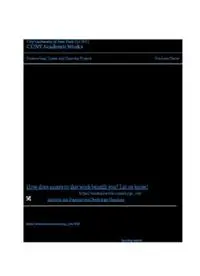
Leadership Ineffectiveness: The Interactive Effects of Leader Personality, Job Demands, and Job PDF
Preview Leadership Ineffectiveness: The Interactive Effects of Leader Personality, Job Demands, and Job
City University of New York (CUNY) CUNY Academic Works All Dissertations, Theses, and Capstone Dissertations, Theses, and Capstone Projects Projects 5-2018 Leadership Ineffectiveness: The Interactive Effects of Leader Personality, Job Demands, and Job Resources on Ethical Climate and Employee Turnover Intentions Michelle D. Corman The Graduate Center, City University of New York How does access to this work beneft you? Let us know! More information about this work at: https://academicworks.cuny.edu/gc_etds/2629 Discover additional works at: https://academicworks.cuny.edu This work is made publicly available by the City University of New York (CUNY). Contact: i Leadership Ineffectiveness: The Interactive Effects of Leader Personality, Job Demands, and Job Resources on Ethical Climate and Employee Turnover Intentions By Michelle D. Corman A dissertation submitted to the Graduate Faculty in Psychologiyn partial fulfillment of the requirements for the degree of Doctor of Philosophy, The City University of New Yo rk 2018 ii © 2018 Michelle D. Corman All Rights Reserved iii Leadership Ineffectiveness: The Interactive Effects of Leader Personality, Job Demands, and Job Resources on Ethical Climate and Employee Turnover Intentions by Michelle D. Corman This manuscript has been read and accepted for the Graduate Faculty in Psychology in satisfaction of the dissertation requirement for the degre eof Doctor of Philosophy. April 2, 2018 Joel Lefkowitz Date Chair of Examining Committee April 2, 2018 Richard Bodnar Date Executive Officer Supervisory Committee Harold Goldstein Jaihyun Park Charles Scherbaum Logan Watts iv ABSTRACT Leadership Ineffectiveness: The Interactive Effects of Leader Personality, Job Demands, and Job Resources on Ethical Climate and Employee Turnover Intentions by Michelle D. Corman Advisor: Dr. Joel Lefkowitz Goals of the present research were to demonstrate that: (a) leadership personalityi s related to employee perceptions of the organization’s ethical climate; (b) leader job stress moderates this relationship for certain personality attributes; and (c) such leader-associated ethical climate, in turn, is related to employee turnover intentions and ultimate turnover (see Figure 1). Specifically, I investigated how individual differences inc ertain leadership “dark side” traits interact with leader job stress to influence the perceived ethical climate of their employees, to ultimately impact employee turnover intentions and turnover. Another goal of this research was to make unique predictions for the leadership dark side categories.B oth new scales and a previously validated instrument were used. Specifically, the present research utilized the Hogan Development Scale (HDS), a well-known, validated, and highly utilized instrument to measure leaders’ dark side traits. Three new scales were identified in an archival dataset to assess (a) leader stress; (b) employee ethical climate perceptions; and (c) employee turnover intentions. Data were initially collected from a large organization headquartered in the United States, and represent responses from 498 managers mapped to team data comprising a total of 5,275 direct report responses. The present research employed both correlation and moderated mediation statistical techniques to investigate direct, indirect, and interactive relationships among variables. v Keywords: leadership dark side traits, leadership personality, ethical climate, ethical culture, job stress, job demands, job resources, job-demands-resources, employee turnover intentions, employee attitudes, structural equation modeling. vi Table of Contents List of Tables viii List of Figures ix Chapter 1: Introduction 1 Chapter 2: Leadership Models 4 Chapter 3: Study Variables 9 Leadership Dark Side Traits 9 Category I Dark Side Personality Traits 12 Category II Dark Side Personality Traits 20 Category III Dark Side Personality Traits 26 Culture and Climate 37 Culture 37 Climate 38 The Interactive Effects of Dark Side Traits, Job Demands, and Job Resources 48 Job-Demands-Resources 50 Job Demands, Job Resources, and Leader Dark Side Traits 53 Employee Turnover 56 Chapter 4: Method 60 Participants 60 Procedure 61 Measures 61 Leader Dark Side Traits 62 Leader Job Demands, Job Resources, and Job Stress 62 vii Ethical Climate 64 Employee Turnover Intention 65 Employee Turnover 66 Hypothesis Testing 66 Chapter 5: Results 68 Preliminary Analyses 68 Main Results 70 Descriptive Statistics 70 Correlates 70 Hypothesis Testing Using Pearson Correlation Analysis 72 Hypothesis Testing Using Path Analysis 74 Chapter 6: Discussion and Conclusion 78 Discussion 78 Leader Dark Side Traits 78 Leader Job Demands, Job Resources, and Job Stress 82 Ethical Climate 83 Employee Turnover 84 Conclusion 85 Tables 87 Figures 100 References 108 viii List of Tables Table 1. DSM-IV Personality Disorder HDS Themes 87 Table 2. HDS Categories, Scales, and Sample Items 89 Table 3. Job Demands and Job Resources Indices Created for the Present Research 91 Table 4. Ethical Climate Index Created for the Present Research 92 Table 5. Employee Turnover Intention Index Created for the Present Research 93 Table 6. Job Demands and Job Resources Factor Matrix 94 Table 7. Ethical Climate and Turnover Intentions Factor Matrix 95 Table 8. Ranges, Means, Standard Deviations, and Reliabilities for Study Variables 96 Table 9. Correlations table for Study Variables 97 Table 10. Correlations between HDS Category II Traits and Ethical Climate Items 98 Table 11. Correlations between HDS Category III Traits and Ethical Climate Items 99 ix List of Figures Figure 1. Predicted Model of Results for Category I and II Leader Dark Side Traits 100 Figure 2. Predicted Moderation Effect of Leader Job Stress 101 Figure 3. Predicted Interactive Effects for Category I and II Leader Dark Side Traits 102 Figure 4. Predicted Main Effects for Category III Dark Side Traits 103 Figure 5. Job Demands and Job Resources Facets identified in the literature 104 Figure 6. Job Demands and Job Resources Scree Plot 105 Figure 7. Ethical Climate and Turnover Intentions Scree Plot 106 Figure 8. Re-Specified Model of Results 107
